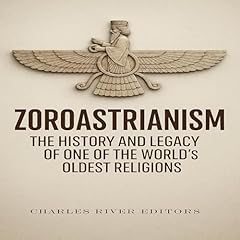
The Visigothic Kingdom of Tolosa
The History and Legacy of the Goths’ Kingdom in Gaul During the Collapse of the Roman Empire
Artikel konnten nicht hinzugefügt werden
Der Titel konnte nicht zum Warenkorb hinzugefügt werden.
Der Titel konnte nicht zum Merkzettel hinzugefügt werden.
„Von Wunschzettel entfernen“ fehlgeschlagen.
„Podcast folgen“ fehlgeschlagen
„Podcast nicht mehr folgen“ fehlgeschlagen
Nur 0,99 € pro Monat für die ersten 3 Monate
 Bist du Amazon Prime-Mitglied?
Bist du Amazon Prime-Mitglied?Audible 60 Tage kostenlos testen
Für 7,95 € kaufen
-
Gesprochen von:
-
Jim Johnston
Über diesen Titel
The birth of Europe as people know it today was hardly an easy and effortless process. The Old World was reshaped by centuries of continuous wars, raids, and the falls and rises of empires. The most turbulent of these events happened at the beginning of the Middle Ages, from the third through seventh centuries CE. This was the time when the old slave society gave way to the feudal system that marked the latter Middle Ages, and it was also a period of battles between the Roman Empire and various barbarian peoples. The Roman Emperors waged wars, made and broke alliances, and bribed and negotiated with chieftains of various “barbarian” tribes to preserve the territorial integrity of their empires, but the razor-edge division between the civilized world of the Romans and that of the “savages” that threatened their borders was dulling with every decade. In fact, the constant need for army recruits swelled the Roman legions with barbarian foederati, a phenomenon that forced both the Romans and Byzantines to use a very subtle way of playing the barbarian tribes against each other via diplomatic schemes and bountiful rewards. A new religion was also taking root: Christianity became a reason for both unification and division, as different people adopted different variations of its teachings.
It goes without saying that the Goths played an integral part in the history of Europe during this time, and they remain among the most notorious and controversial groups in history. By the fourth century CE, The Goths were among the prominent barbarian groups who became a threat to the Roman Empire, but they also had contacts with the Romans well before then, and they even traded for awhile. The two branches of the Goths that are best known, the Visigoths and Ostrogoths, stared down the Roman Empire as it neared its collapse and supplanted it with a kingdom in Italy in the 5th and 6th centuries respectively. The Visigoth leader Alaric and the Ostrogoth leader Theodoric are still well-known names due to their deeds and reigns in Europe.
In addition to the Visigoths’ conflicts with Rome, the ancient author Jordanes has helped keep the Goths relevant with his seminal work The Origin and Deeds of the Goths, which traces the group’s history all the way back to about 1500 BCE and covers their migrations and wars on the European continent. While some still discount Jordanes’ work as outright fiction, most historians still believe that it’s a valuable historical work, and they continue to rely on it in attempts to study and trace the history of the Goths and their various branches over time.
What is known is that the Goths established the Kingdom of Tolosa, one of many small kingdoms that emerged during the final years of the Roman Empire in the fifth century CE. Despite its size and limited fame, it has an important place in European history, not necessarily because of its own achievements (it was never a great power) but more for its influence on the course of events following the end of the Western Roman Empire. The Visigoths themselves are a much maligned and misunderstood ethnic group, so the extent of their influence on the emerging political structures of Spain and France, as well as those nations’ cultures, is often forgotten. In particular, Tolosa´s part in halting the seemingly unstoppable advance of Attila and the Huns should be remembered, given its importance for the future history of Europe. Indeed, an exploration of this small kingdom provides invaluable insights into how Western Europe developed in the period commonly referred to as the “Dark Ages,” an era that actually had positive impacts on European culture.
©2020 Charles River Editors (P)2020 Charles River Editors



















